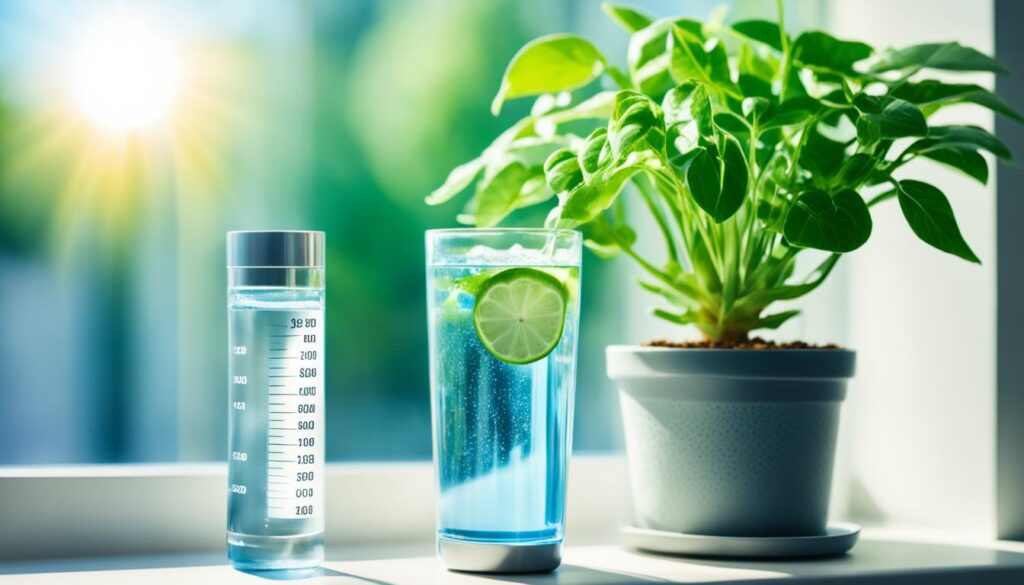Intermittent fasting is now a popular way to manage weight and prevent health issues. It involves fasting and eating in cycles. This method improves insulin sensitivity, reduces inflammation, and helps burn fat. The water diet is a new twist that aims to make intermittent fasting even more effective.
The water diet, or water fasting, means not eating or drinking anything except water for 24-72 hours. It combines fasting with staying hydrated and cutting calories. This can lead to weight loss, better insulin sensitivity, and overall health improvement. Studies show it can lower blood pressure, reduce triglycerides, and stop cancer cell growth genes.
But, the water diet should be approached with care. Long fasting periods can cause dehydration, dizziness, and fainting. It’s not good for everyone. People with gout or eating disorders should talk to a doctor before starting. By adding the water diet to a balanced fasting routine and focusing on hydration and nutrition when eating, you can safely improve your health.
Key Takeaways
- The water diet, or water fasting, involves restricting all food and beverages except for water for 24-72 hours.
- Combining water fasting with intermittent fasting may enhance weight loss, improve insulin sensitivity, and promote overall health.
- Water fasting has been associated with lower blood pressure, decreased triglyceride levels, and suppression of cancer cell growth genes.
- Prolonged fasting can lead to side effects such as dehydration, dizziness, and fainting, and may not be suitable for everyone.
- Those with certain medical conditions should consult with a healthcare professional before attempting a water fast.
What is Intermittent Fasting?
Intermittent fasting (IF) is a popular health trend worldwide. It’s about eating less by focusing on when you eat, not what. This method helps people lose weight and improve health while making life simpler.
How Intermittent Fasting Works
There are many ways to do intermittent fasting, each with its own schedule. Some top methods are:
- The 16/8 method: You fast for 16 hours and eat in an 8-hour window. Skipping breakfast and eating from 12 pm to 8 pm is an example.
- The 5:2 approach: You eat normally for five days and eat very little on two days a week.
- Eat-stop-eat: This means fasting for 24 hours a few times a week.
When fasting, your body uses up sugar and starts burning fat. This can help you lose weight and improve health. It’s important to eat well when not fasting to avoid overeating or making unhealthy choices.
Benefits of Intermittent Fasting
Research shows many health benefits of intermittent fasting, such as:
- Weight loss: Studies found weight loss from 0.8% to 13% of starting weight in overweight and obese people.
- Improved insulin sensitivity: It can make insulin work better and lower inflammation, helping with blood sugar and diabetes prevention.
- Enhanced brain function: Fasting boosts a brain hormone that helps with thinking and memory.
- Heart health benefits: It may lower blood pressure and heart rate, improving heart health.
- Increased physical performance: Some studies show it can improve how well you perform physically.
- Reduced tissue damage: It can lessen tissue damage during surgery and improve recovery.
But, intermittent fasting isn’t right for everyone. It’s not good for kids, pregnant or breastfeeding women, people with type 1 diabetes, or those with eating disorders. It’s best to talk to a doctor before starting. You might feel hungry, weak, or less focused at first.
“Intermittent fasting can be a game changer for many people, offering a simple and effective way to improve health and lose weight. But as with any diet or lifestyle change, it’s crucial to listen to your body and consult with a healthcare professional to ensure it’s the right approach for you.” – Dr. Mark Mattson, Professor of Neuroscience at Johns Hopkins University
Understanding the Water Diet
The water diet, also known as water fasting, means not eating and only drinking water for a few days. People do this for many reasons, like losing weight, detoxing, or getting ready for surgery.
What is Water Fasting?
Water fasting is a type of fasting where you don’t eat or drink anything except water. It usually lasts from 24 to 72 hours. Some people even fast for longer, up to 20 days, but that should be with a doctor’s advice.
How to Do a Water Fast
Before starting, get your body ready by eating less or fasting for a few hours each day. During the fast, just drink water and skip all food. It’s important to drink 2-3 liters of water a day to stay hydrated.
When you stop fasting, don’t eat too much right away. Start with a smoothie or small meals and slowly increase the size over a few days. This helps avoid health problems after fasting.
Potential Benefits of Water Fasting
Water fasting might have many health benefits, such as:
- Promoting autophagy, a process that helps the body recycle old cells, which may protect against diseases like cancer and Alzheimer’s
- Lowering blood pressure in people with high blood pressure
- Improving how well insulin and leptin work
- Reducing the risk of chronic diseases like diabetes and heart disease
- Helping cancer cells not grow and making chemotherapy work better
- Lowering LDL cholesterol and reducing inflammation
| Fasting Duration | Potential Benefits |
|---|---|
| 24-72 hours | Weight loss, detoxing, preparing for medical procedures |
| 5-20 days | Reduced fasting blood sugar levels, insulin levels, and hemoglobin A1c |
| 8 days | Average weight loss of over 13 pounds and significant body fat reduction |
| 10-11 days | Lowered blood pressure to normal levels in approximately 90% of participants |
Water fasting might have health benefits, but we need more studies to know for sure. Always talk to a doctor before starting any fasting plan.
How the Water Diet Enhances Intermittent Fasting Results
Combining the water diet with intermittent fasting boosts weight loss and health. The water diet keeps you hydrated during fasts, making it easier for beginners. This combo leads to more fat loss, better insulin sensitivity, and control over blood sugar.
Combining Water Fasting with Intermittent Fasting
Adding water fasting to your routine helps you stay hydrated and extends your fasts. Start with shorter water fasts and gradually increase the time as you get used to it. Listening to your body and staying hydrated helps you combine these strategies effectively.
Increased Weight Loss and Fat Burning
Water fasting with intermittent fasting leads to more weight loss and fat burning. It puts your body into ketosis, making it burn fat for energy instead of glucose. This can help you break through weight loss plateaus and increase fat loss. Studies show impressive results:
| Fasting Duration | Weight Loss |
|---|---|
| 5 days | 4% to 6% |
| 7 to 10 days | 2% to 10% |
| 15 to 20 days | 7% to 10% |
But, remember, some initial weight loss might be from water and muscle loss. To keep your muscle mass, eat a balanced diet during your eating windows.
Improved Insulin Sensitivity and Blood Sugar Control
Combining the water diet with intermittent fasting improves insulin sensitivity and blood sugar levels. Longer fasts let your body use fat for energy, reducing insulin resistance and lowering blood sugar. This is great for people with prediabetes or type 2 diabetes, helping them manage their condition better.
Some studies included participants with Type 1 and Type 2 diabetes who showed no ill effects from fasting.
But, if you have diabetes, talk to your doctor before starting any fasting plan. They can help you manage it safely.
Tips for Successful Water Fasting

Starting a water fast can be tough but rewarding. To make it successful, prepare your body and mind well. Start by eating less and skipping snacks before your fast. This helps your body get used to eating less.
It’s key to drink lots of water while fasting. Aim for 2 to 3 liters a day to make up for not eating. Remember, food usually gives us about 20% of our daily water. So, you might need to drink more than usual. If you feel dizzy, nauseous, or tired, stop fasting early and talk to a doctor.
“Water fasting can lead to a reduction in circulating insulin levels by 30% after fasting for three days or longer, according to research.”
Choose a good time for your fast when you can rest. Don’t fast during busy or stressful times. Tell your family about your fasting plans so they can support you. Getting ready is crucial for a good fast.
Ending your fast is important too. Don’t eat too much at first. Start with small, healthy meals. Eat foods like fruits, veggies, and soups first. This helps your body adjust to eating again smoothly.
- Prepare your body by gradually reducing portion sizes and eliminating snacks.
- Stay hydrated by drinking at least 2 to 3 liters of water per day during the fast.
- Choose a time for your fast when you can rest and relax.
- Inform loved ones about your fasting plans for support.
- Break the fast gradually with small, nutrient-dense meals.
Water fasting isn’t right for everyone. People with diabetes or kidney issues should not do it. Always talk to a doctor before starting a fast to make sure it’s safe for you.
Potential Risks and Precautions
Water fasting can be beneficial when done right, but it’s important to know the risks. Not everyone can do it safely. Some people should avoid it to stay healthy.
Who Should Avoid Water Fasting
Some groups should not try water fasting because of the risks. These include:
- Children and teenagers who are still growing and developing
- Pregnant or breastfeeding women
- Older adults, especially those with pre-existing medical conditions
- Individuals with chronic medical conditions such as diabetes, heart disease, kidney problems, or liver disease
- People with a history of eating disorders or disordered eating patterns
Experts say to be careful or get a doctor’s advice before fasting. This is true for people over 65, with diabetes, heart, kidney, or liver disease, a history of eating disorders, pregnant or breastfeeding, low blood pressure, or on certain meds.
Side Effects and Dangers of Prolonged Fasting
Prolonged water fasting can cause side effects and dangers. Some common issues include:
- Dehydration: The body gets most of its water from food, so fasting can lead to dehydration.
- Orthostatic hypotension: This is a drop in blood pressure when standing up, caused by dehydration. It can make you dizzy or faint.
- Electrolyte imbalances: Longer fasts can mess with the body’s balance of important electrolytes, causing health problems.
- Refeeding syndrome: This is a serious condition that happens when the body rapidly changes its fluids and electrolytes after starving.
| Potential Side Effects | Symptoms |
|---|---|
| Fatigue | Weakness, lack of energy, difficulty concentrating |
| Dizziness | Lightheadedness, unsteadiness, vertigo |
| Nausea | Feeling sick to the stomach, urge to vomit |
| Constipation | Difficulty passing stools, abdominal discomfort |
To avoid these risks, fast with a doctor’s help and ease back into eating with small, balanced meals. Knowing the dangers helps you fast safely. This way, you can improve your health with water fasting.
Incorporating the Water Diet into Your Intermittent Fasting Routine
Adding a sustainable water diet to your intermittent fasting can boost both practices. It helps with weight loss, better metabolic function, and overall health. By mixing water fasting with a diet full of nutrients during eating times, you get a strong combo. This combo helps you reach your weight loss goals and live a healthier life.

Creating a Sustainable Water Diet Plan
Starting a water diet with intermittent fasting needs a good plan. Pick an eating schedule that fits your life, like the 16/8 or 5:2 method. As you start water fasting, slowly increase the time you fast as your body gets used to it. Drink 2-3 liters of water a day during fasts to help your body clean itself and avoid dehydration.
Here are tips to make your intermittent water fasting work better:
- Start with shorter fasts, like 12-16 hours, and increase the time as you get used to it.
- Choose a fasting schedule that works with your life, making sure you can stick with it.
- Drink water, herbal teas, or flavored water with lemon or cucumber during fasts to stay hydrated.
- Listen to your body and stop fasting if you feel bad or uncomfortable.
Balancing Fasting with a Nutritious Diet
To get the most from your water diet and fasting, eat well during your eating times. Focus on whole foods that give you lots of vitamins, minerals, and nutrients. This helps your body work right and keeps you healthy.
When you break your fast, eat foods that are easy to digest. Add foods full of nutrients to your meals, like:
- Fresh fruits and veggies, full of fiber, antioxidants, and important nutrients.
- Lean proteins, like eggs, fish, poultry, and beans, help with muscle repair and maintenance.
- Healthy fats from avocados, nuts, seeds, and olive oil give energy and make you feel full.
- Complex carbs from whole grains, sweet potatoes, and quinoa give you energy and fiber.
Eating balanced meals with whole foods makes sure your body gets what it needs. This helps with weight loss, boosts your health, increases energy, and makes sticking to your diet easier in the long run.
Conclusion
The water diet and intermittent fasting are great for losing weight and boosting health. Studies like those by Varady KA & Hellerstein MK in 2007 and Horne BD et al. in 2013 show their benefits. They help with body composition, energy, and heart health.
The Big IF Study, with over 100,000 participants, also found positive effects. These include better energy, digestion, and weight control.
But, it’s important to be careful with these diets. Prolonged fasting can cause headaches, fatigue, anxiety, and vomiting. A 2022 study showed nearly 50% of participants stopped due to these issues.
So, talking to a healthcare professional before starting is key. This is especially true for those with health issues or at risk from fasting.
To get the most out of the water diet and fasting, eat well during your eating times. Focus on whole foods and drink plenty of water. This way, you can support your health goals and keep fasting sustainable. With the right mindset and precautions, these diets can greatly improve your health.




